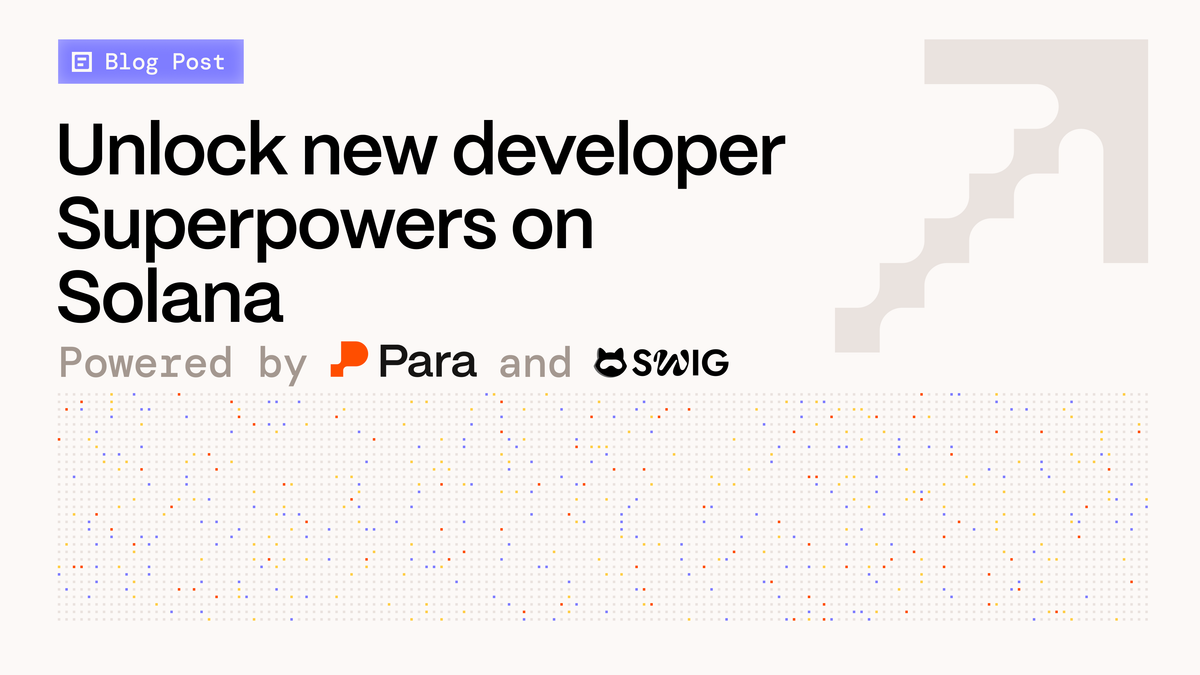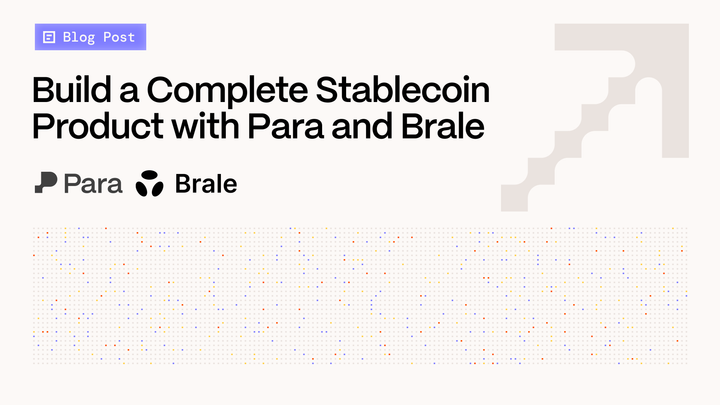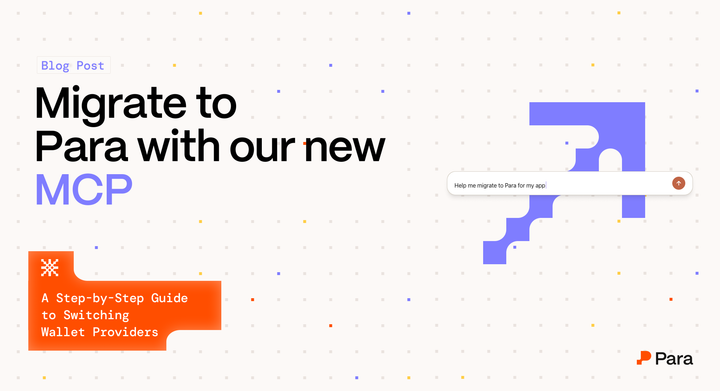Unlock New Developer Superpowers on Solana with Para + Swig

Originally posted on the Swig blog.
Today, we’re excited to highlight how developers building on Solana can leverage the toolkits of Swig and Para in combination with each other to build powerful Solana apps. Swig, the smart wallet toolkit for Solana, and Para, the wallet and auth suite known for embedded wallets, have made it easy for developers to build innovative functionality into their Solana apps in less than 30 minutes.
Solana has become the #1 blockchain for new developers, with over 7,625 builders joining the ecosystem in 2024 alone. Despite this success, developers consistently report that wallet integration remains their biggest pain point. Users abandon applications when faced with seed phrases, manual transaction approvals, and the need to hold SOL for gas fees. Developers still face a fundamental challenge: how to create crypto applications that are both powerful and accessible to mainstream users. The combination of Para's embedded wallets and Swig's smart wallet infrastructure changes that.
Over 50% of new crypto users now prefer embedded wallets over connecting external ones. Para provides universal embedded wallets that onboard users in seconds with familiar social logins – reusable across apps and chains like single sign on. Simultaneously, applications increasingly need programmable features like automated payments, spending limits, and multi-user permissions. Swig adds programmable smart wallet capabilities that not only solve these programmability needs, but also take them to new levels. Together, Para and Swig enable experiences that weren't previously possible on Solana.
What the Swig ✕ Para Combo Unlocks for Developers
When you combine Para’s embedded wallet experience with Swig’s smart wallet features, Solana developers gain a toolkit for crafting truly seamless and powerful user experiences:
1. Gasless Onboarding via Paymasters
Imagine letting your users onboard and transact on Solana without ever worrying about SOL for gas or seed phrases for keys. That will now be a reality. Swig’s upcoming paymaster feature enables developers to sponsor transaction fees on behalf of users, creating a gasless experience. By combining Para’s Solana embedded wallets with Swig’s paymasters, developers can offer “no gas” onboarding, where new users can sign into an app with an email address and without holding any SOL, and the app can cover or abstract away the network fees and seed phrase complexity. This means better conversion and a smoother introduction to Solana for mainstream users.
2. Transaction Bundling via Session Keys
With Para + Swig, developers can bundle multiple transactions or actions into one seamless user interaction. For example, your app can handle prerequisite steps (like token approvals, transfers, or contract calls) behind the scenes, instead of making the user approve each one. Swig’s session key functionality enables this by allowing developers to give an app temporary permission to execute a series of actions without prompting the user every single time. The result? Smoother UX, especially for high-frequency or complex apps. Building on Swig x Para lets you abstract away complexity and deliver one-click magic for actions that used to require many steps. Your users will no longer be slowed down by repetitive approval pop-ups.
3. Granular Role-Based Permissions
Swig introduces role-based permissions that go far beyond basic multi-sig control. By also building on Swig, applications using Para can enable a single wallet to be shared among multiple users, each with custom permissions and limits. Developers can programmatically define roles. For example, a business could give an employee “Junior” privileges to send transactions up to a daily limit, while the “Manager” role can approve larger transfers or assign permissions to other employees. By leveraging Para’s auth, each participant can easily login and manage the wallet via email or oAuth, eliminating the need for managing seed phrases in browser extensions. Swig’s smart wallet architecture supports delegated access and team wallets, so you can assign different rights to different people all within one on-chain wallet. This is a game-changer for use cases in need of multi-permissioned collaboration functionality on Solana. No more one-size-fits-all private key sharing or clunky multi-sigs. Instead, you have flexible control built into the wallet itself. By leveraging Para together with Swig’s fine-grained, configurable permissioning, developers can create collaborative crypto experiences that are both secure and convenient.
Who Benefits?
- Consumer Apps: Projects onboarding mainstream users can offer smoother sign-up and usage. With Para’s embedded wallets and Swig’s gasless transactions, newbies won’t be scared off by complex wallet setup or fees. Expect higher conversion and happier users from the first click. Solana apps targeting everyday users (social apps, gaming, marketplaces) can combine a Web2 user experience with Web3 ownership.
- Trading & High-Frequency Apps: Exchanges, trading bots, and DeFi protocols where users make frequent transactions benefit hugely from session-based signing. With Para combined with Swig’s session keys, a trading app can easily onboard users and execute a flurry of trades or complex strategies in one go, without prompting signatures for each step.
- Apps with Multi-Role Collaboration: Platforms building crypto solutions for businesses, teams, or DAOs can now implement shared wallets with role-defined controls. Swig is configurable to fit the needs of endless scenarios. It allows organizations to delegate wallet access to roles with pre-defined permissions, or even AI use cases to build on-chain AI swarms for agentic collaboration. Combined with Para’s easy auth, team members can easily log in via email or SSO to unlock use cases on Solana that previously required cumbersome wallets and custom logic.
Getting Started: Build on Swig + Para
Check out the Para and Swig docs today to build your Solana use case in less than 30 minutes and benefit from the combined power of our respective toolkits.



